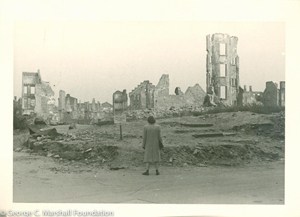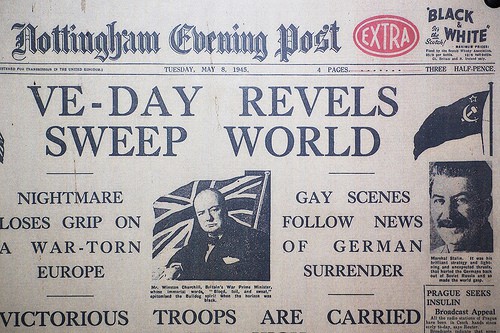I have decided to forgo my initial project on tracing the immigration and culture of the American South through food in favor of documenting the Marshall Plan. While my original topic was rich and personally interesting to me, I was having a difficult time finding the original documents I was looking for (diaries, manifests, recipes). I think this

will be a great project for a later time. Instead I looked at the assignment in a slightly different way: to follow the documents. I knew that if I chose a more modern historical event, there would be more documents. The next step was to find an event that was rich and interesting and could be used to ask over-arching generative questions. The Marshall Plan meets both criteria perfectly. In talking with Erik Nelson about his project on the Treaty of Versailles, it became clear to me the the Marshall Plan presented a complete change in post-war policy. Rather than punish and weaken the losing sides, the Marshall Plan sought to strengthen not just our allies in Europe, but Germany and even Russia as well. This was a controversial plan and there are entire libraries dedicated to documenting characters who put this plan together. It could easily be argued that this was the high water mark for U.S. foreign policy.
The Set Up
I will use a mixture of photographs, posters, and speeches to show the many facets and interests involved in this monumental action. Before Congress could approve the billions of dollars required, both America and Europe needed to come together in a new way. The United Nations is in it’s infancy and this will be a major test. While a necessary ally during the war, relations between the United States and the Soviet Union are already showing signs of mistrust and antagonism.

The Questions
The overall purpose of the unit is to have the students use historical thinking to look at the Marshall plan in an authentic way from many perspectives. They should be able to address the larger questions this event brings up:
- Are there responsibilities to the victors in war?
- Is there a quid pro quo for reconstruction/ nation building?
- How did the Treaty of Versailles influence the making of the Marshall Plan?
- Why was the United States in a position to help in the first place?
- How did the United States relationship with Russia help or hinder European reconstruction?
Looking Ahead

I am eagerly looking forward to working on this project. Not only am I getting practice in designing instruction that challenges students, I am learning so much about the subject matter. At this point these DBQ projects take a tremendous amount of time to assemble. But I am beginning to see how the process can be streamlined. The more comfortable I am knowing where to look for documents, what questions to ask, and how to put it all together, the easier this will all become. In the mean time I am enjoying the self directed project based learning as a student. I hope my students will come away with some of the same enthusiasm.

Too bad about tracing immigration and culture of the American South through food. You can write that book some day.
The Marshall plan looks promising. The five questions you list are all interesting. They all point to the debate over foreign aid and wealthy nations’ “responsibility” to help the less fortunate. Still a big subject today – global warming, Ebola, etc
A few initial thoughts:
1. It would be interesting to contrast US popular media following WWI and WWII. Students could make that comparison.
2. Was it simply aid or US economic imperialism? (they used our money to buy our goods and raw materials).
3. Might compare Marshall plan dollars to American cultural outreach after the war.
We’ll discuss in class Monday. Remember this isn’t a definitive history of the Marshall plan, but a question the students can feasibly answer with the support of the documents
Yes, the Southern Food History Cookbook… Right there with you on economic imperialism, part of the opportunity of the title. Emily turned me on to an article linking the boom in processed foods and bumper wheat crops to European recovery as well. Erik and I are also thinking of perhaps sharing some documents but asking different questions which might be cool.